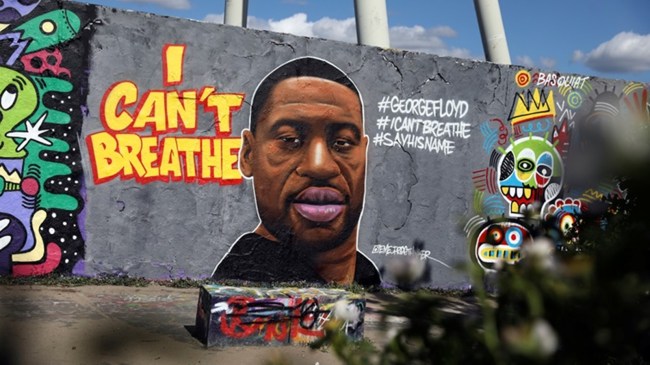Opinion Five years since the murder of George Floyd, many of the commitments made to address systemic racism have been abandoned
The Black community in the US now faces the most formidable federal governmental obstacles against its efforts to achieve racial equality since the 1940s
 In the aftermath of George Floyd’s killing, America witnessed some of the largest protest marches in its history.
In the aftermath of George Floyd’s killing, America witnessed some of the largest protest marches in its history. Written by Kevin Brown
In the five years since the extrajudicial police killing of George Floyd, much has changed for the Black community in the United States, but not in the way one would have expected at the time. While the Black community had complained of systemic racism for decades, George Floyd’s killing provided America with undeniable, visible evidence of its existence, at least regarding police conduct.
Since the involuntary incorporation of Black people as chattel slaves starting in 1619, systemic racism has existed in virtually all major aspects of American society. In 2020, the median Black family income was 60 per cent of that of white non-Hispanic family income; Black people were nearly three times more likely to live in poverty; 42 per cent of Black families owned their own home, contrasted with 70 per cent of white non-Hispanic families; and median Black family wealth was $24,100 compared to $188,000.
Regarding the administration of criminal justice, studies have shown that Black people are more likely to be arrested by the police than white non-Hispanics for the same offences, more likely to be charged with a crime when arrested, more likely to be convicted when charged with a crime, more likely to serve a prison sentence when convicted, and when given a prison sentence, they are given longer ones. Even though there are five times more white males in the US than Black males, 10 per cent more Black males are incarcerated.
In the aftermath of George Floyd’s killing, America witnessed some of the largest protest marches in its history. As if waking up to the existence of systemic racism, CEOs of major corporations, governmental officials, educational administrators and non-profit organisations pledged to institute policies and programmes to attack it. For example, Google committed $50 million to Historically Black Colleges and Universities, JP Morgan Chase allocated $30 billion in housing and business loans to support Black and Latinx communities, Apple launched its Racial Equity and Justice Initiative with $100 million and the Department of Justice began investigations of police departments throughout the country to identify patterns of excessive force and disproportionate targeting of Black people.
The commitment to address systemic racism, however, produced an unprecedented backlash that began almost immediately. White conservative voices raised the level of their complaints on media outlets against the concept of systemic racism, critical race theory (CRT) and diversity, equity and inclusion (DEI) initiatives. They claimed programmes and policies embodied in these concepts were destroying America by teaching false doctrines and abandoning meritocracy. In their eyes, there may be a few racist individuals, but systemic racism does not exist.
These conservatives found a sympathetic spokesperson in then-President Donald Trump. On September 22, 2020, less than four months after Floyd’s killing, Trump issued the Presidential Executive Order 13950 that criticised CRT as a divisive concept and sought to exclude diversity and inclusion training from public and private entities that receive federal contracts. Trump’s loss in the November 2020 elections, where, according to CNN exit polls, he only received 12 per cent of the Black vote, but 58 per cent of the white non-Hispanic vote, slowed down the momentum of the building white conservative backlash.
However, after upholding affirmative action in admissions of selective higher education institutions for 45 years, in June of 2023, the US Supreme Court struck it down nationwide in a 6-3 decision. Even though People of Colour (Black, Latinx, Asian, Native Americans and Mixed-Race people) make up the majority of Americans under the age of 18, the Court rejected the rationale that the benefits of diversity justified taking race into account in the admissions process.
The implications of the Court’s opinion were somewhat muted during the 2024 election, where the Democrats nominated Kamala Harris, a woman of mixed South Asian and Black ancestry, as their presidential candidate. In the 2024 elections, Trump received a similar percentage of votes from Black and white non-Hispanic voters that he received in the 2020 election. But Asian and Latinx voters substantially increased their support for Trump. Thus, in the 2024 elections, not only did he win the Presidency, but the Trump-dominated Republican Party took control of both Houses of Congress. Effectively, the Black community now faces not only what legal experts assert is the most conservative Supreme Court since the 1950s, but also a hostile President and Congress.
most read
Since returning to the Presidency, Trump has exercised power like no other American president ever. As a result, a significant number of Trump’s executive orders have been enjoined by the federal courts. Nevertheless, Trump has put pressure on major corporations, the most elite colleges and universities and state and local governments to end their DEI programs. As part of the Trump Administration, the Department of Justice has gone from combating racism against underrepresented minorities to targeting public and private institutions with DEI programs because they are viewed as discriminating against white people.
Consequently, many of the commitments made to address systemic racism have been abandoned. Thus, five years after the murder of George Floyd, the Black community in the US faces the most formidable federal governmental obstacles against its efforts to achieve racial equality since the 1940s.
The writer is Richard S Melvin Professor Emeritus, Indiana University Maurer School of Law & Mitchell Willoughby Professor, Joseph Rice School of Law of the University of South Carolina




